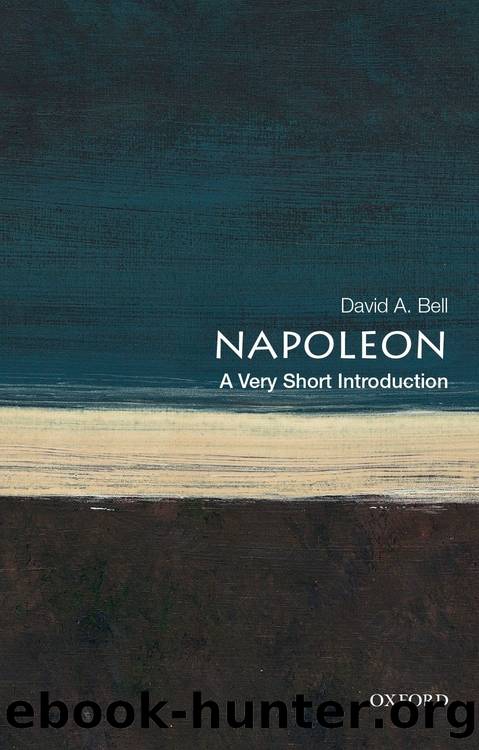Napoleon: A Very Short Introduction by David A. Bell

Author:David A. Bell [Bell, David A.]
Language: eng
Format: epub
ISBN: 9780199321681
Google: 5jBtDwAAQBAJ
Publisher: Oxford University Press
Published: 2018-09-10T23:00:00+00:00
Even amid the glitter of the coronation ceremony, one glimpse of the older, less pompous Napoleon could still be found. As he stood in his heavy robes, under the great vaulted ceiling of Notre Dame, scepter in hand, he turned to his brother Joseph, now dressed as a prince, and whispered, grinning: âIf Papa could see us now.â But in coming years, this older Napoleon would be seen less and less.
Chapter 4
The emperor, 1804â1812
Perhaps because Napoleon mythologized himself so insistently, it is easy to imagine him as a series of figures from Greek mythology. For the early Napoleon there is Hercules, accomplishing apparently impossible feats and sweeping out the Augean stables of French government with his consulâs broom. For the late Napoleon, one thinks of Prometheus: the titan chained to his South Atlantic rock, pecked at by English vultures. And for the emperor in his heyday, the figure that comes irresistibly to mind is Icarus, soaring higher, higher, and higher still, until suddenly his wings fall apart and he plummets from the sky. Except that in Napoleonâs case it is not the heat of the sun that prompts his fall but the howling chill of the Russian winter.
But such images are deceptive, and none more so than the last. One can certainly write Napoleonâs career between 1804 and 1812 as a series of battles won (Austerlitz, Jena, Friedland, Borodino) or enemy capitals triumphantly entered (Vienna, Berlin, Madrid, Moscow). One can also write it by tracing the expanding borders of the First Empire on the map. By 1812 they extended across northern Germany to the borders of Denmark, down the Italian peninsula to Rome, and across the Pyrenees to Barcelona. The rest of Italy and Spain were satellite states, along with Polandâs âDuchy of Warsaw,â and the âConfederation of the Rhineâ in Germany.
A shrunken Prussia and Austria had become subservient allies. By these standards, the period looked like one of steady ascent.
Napoleon certainly relished his victories and his conquests, which only confirmed his belief in his unique, transcendent destiny. But in truth, as the years passed after 1804, on almost every level he controlled events less and less. The new political and military forces unleashed by the French Revolution, which had made possible his astonishing conquests and reforms, did not allow him to consolidate and preserve them. Instead, a different geopolitical dynamic took shape. On the level of grand strategy, Napoleon felt increasingly forced into incessant war and annexation, above all because of his inability to overcome his greatest and most supremely frustrating enemy, Great Britain. On the battlefield the contending armies grew exponentially, becoming far more difficult to manageâand more and more of the battles themselves were either lost or barely won, and at a frightful cost. And the conquered territories refused to stay conquered, with insurgents dragging the French into a series of painful and draining guerrilla wars. In retrospect, the bloated boundaries of the empire in 1812 look less like the markers of a new Roman Empire than the skin of a bubble about to burst.
Download
This site does not store any files on its server. We only index and link to content provided by other sites. Please contact the content providers to delete copyright contents if any and email us, we'll remove relevant links or contents immediately.
Machine Learning at Scale with H2O by Gregory Keys | David Whiting(4297)
Never by Ken Follett(3939)
Harry Potter and the Goblet Of Fire by J.K. Rowling(3849)
Unfinished: A Memoir by Priyanka Chopra Jonas(3384)
Fairy Tale by Stephen King(3372)
The Man Who Died Twice by Richard Osman(3073)
Will by Will Smith(2913)
Rationality by Steven Pinker(2352)
It Starts With Us (It Ends with Us #2) by Colleen Hoover(2351)
Can't Hurt Me: Master Your Mind and Defy the Odds - Clean Edition by David Goggins(2325)
The Dark Hours by Michael Connelly(2301)
The Storyteller by Dave Grohl(2230)
Friends, Lovers, and the Big Terrible Thing by Matthew Perry(2221)
The Dawn of Everything: A New History of Humanity by David Graeber & David Wengrow(2197)
The Becoming by Nora Roberts(2189)
The Stranger in the Lifeboat by Mitch Albom(2116)
Cloud Cuckoo Land by Anthony Doerr(2104)
Love on the Brain by Ali Hazelwood(2062)
Einstein: His Life and Universe by Walter Isaacson(2013)
